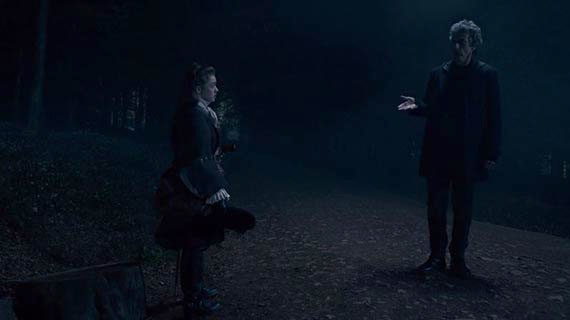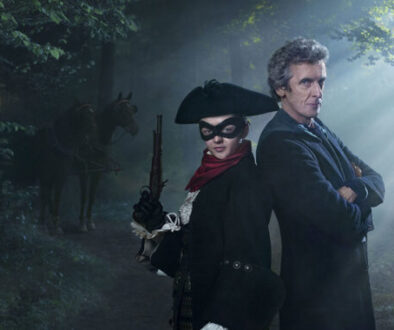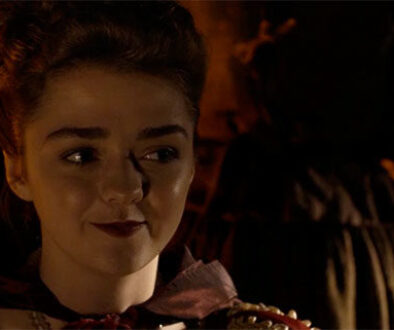The Woman Who Lived Review
Clint Hassell gives his verdict on the sixth episode of Series 9.

In the 800 years between her resurrection, in “The Girl Who Died,” and the events of “The Woman Who Lived,” Ashildr has basically become the Doctor. With several lifetimes of practice, she’s mastered skills like archery, breaking and entering, and combat, which she uses in her grand adventures. Like the Doctor, she’s helped others, founding a leper colony, ending the Hundred Years’ War, and curing an entire village of scarlet fever. “Surgeon, scientist, inventor, composer – – it’s a fantastic CV,” the Doctor comments, after hearing of her many good deeds.
Ashildr’s killed a lot of people, too – – too many to remember, so she’s written them all down in books, eerily similar to The History of the Time War in the Doctor’s personal library. Her message to Sam Swift repeats the Doctor’s signature “Run!” and carries a sense of malice, rather than protective guidance. Most tellingly, just as the Doctor and the Master both chose their names to signify that they wanted to help people and subjugate others, respectively, Ashildr has also taken a name that represents her now self-centered life:
“I call myself ‘Me.’ All the other names I chose died with whoever knew me. ‘Me’ is who I am now. No one’s mother, daughter, wife. My own companion. Singular. Unattached. Alone.”
Repeatedly, the point has been made that the Doctor should never be alone; “The Woman Who Lived” reveals the same to be true of Ashildr. “Humans need shared experiences,” the Doctor admonishes, in a sense reaffirming his own humanity.

“What do you call yourself?”
“Me.”
“Yes, you. There’s nobody else here.”
This exchange is literally “WHO’s on First?”
By establishing Ashildr as a “Doctor” in her own right, script writer Catherine Tregenna is able to examine both the qualities that make the Doctor the person he is, and aspects of the Doctor/companion relationship. While Ashildr yearns to travel with the Doctor, he is unable to take her. “People like us, we go on too long. We forget what matters,” he says, “The last thing we need is each other.” She continues, stating, “Our perspectives are too vast, too far away.” She misses his point: the Doctor cannot travel with Ashildr because she no longer has human emotions. She lives a self-centered life, and therefore, cannot course-correct his actions. The Doctor needs a companion, like Clara, who will slap him, or hand him a carefully worded note card, and remind him to embrace the humanity in himself and others. In comparison, Ashildr only sees a human companion as a weakness.


In examining the reason why Ashildr claims to find little value in human life, Tregenna’s script accomplishes its most impressive feat: giving the narrative a fresh take on immortality. This is no small task, given that Doctor Who has spent half a century mining the subject, but should come as no surprise, as Tregenna’s Torchwood scripts “Out of Time” and “Captain Jack Harkness” deftly focused on aspects of living beyond one’s years. Similar to Harkness, Ashildr first tries to maintain normal relationships, only running away when her never-changing appearance becomes the subject of questions. It is not until her children die during the Black Death that she decides that it’s “Me against the world” (hence her new name). Unlike Jack and the Doctor, who seem to recall much of their extended lifespans, Ashildr remembers only more recent events with any vivacity. Suffering from an “infinite life and a normal-sized memory,” she records her actions into a series of diaries, in order to recall them later. Pages containing any event she’d rather not remember are be ripped out, setting up an interesting comparison: while the Doctor can’t forget, and is therefore haunted by his actions in the Time War, or of Adric’s death, Ashildr is cursed to not only watch the deaths of loved ones, but to then forget them, dishonoring their passing. Unlike Jack, who sees the wonders of successive generations of life, Ashildr views death as abundant because, after 800 years, she’s seen so much of it that she is desensitized.

It is important to note that Ashildr truly blames the Doctor for his impulsive, self-righteous actions that resulted in her immortal state, and significant that Tregenna’s script allows the debate to play out, without judgment. “Oh, Ashildr, what happened to you?” asks the Doctor, pitying her loss of humanity. “You did, Doctor. You happened,” she fires back. Ashildr feels abandoned. She’s stuck living through the mundanity of day-to-day existence, while he is free to cherry-pick the best experiences of all of time and space, and to run away, when things get bad. She is embittered because he is the one that made her immortal, yet didn’t stick around to ensure her well-being. Where’s her “duty of care”? Worse, he provides little in the way of an explanation as to why he won’t take her on board the TARDIS. “Because it wouldn’t be good,” is all he answers, initially.

Are Ashildr and the Doctor adversaries, now? Ashildr claims that they are still friends, but that “it’s your friends you have to watch out for.” Despite sharing a common background, the two have opposing viewpoints, having come to different conclusions about which actions to follow. The best nemesis pairings occur not when one person is good and the other evil, but when both people are convinced that they are correct.
Even in the episode’s epilogue, the Doctor still can’t quite admit that he was wrong. “I think I’m very glad I saved you,” he says both defiant and yet unsure, as if convincing himself, “but, I think I’m going to have to keep an eye on you.” Despite feeling that he needs to monitor her behavior, the Doctor still doesn’t offer Ashildr the one thing she most needs: guidance. Note how this stands in contrast to both Davros and the Master – – far worse people that the Doctor was willing to travel with in order to both corral and rehabilitate.
Ashildr has other plans, however, stating that someone needs to look out for the people he’s abandoned. “Who better than Me? I’ll be the patron saint of the Doctor’s leftovers,” she imagines. “While you’re busy protecting this world, I’ll get busy protecting it from you.” One wonders how long before Ashildr encounters Adam Mitchell, or Joan Redfern, or Journey Blue.
Or River.










